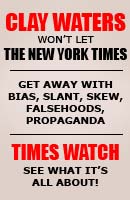During a three-anchor tour on the May 28 edition of CBS’s The
Early Show, CBS anchor Katie Couric endorsed the claim from
former Bush press secretary Scott McClellan that the "liberal
media" didn’t live up to their reputation before the Iraq war.
He wrote the public would have been "better served" by fiercer
anti-war criticism."I think it’s one of the most embarrassing chapters in American
journalism," Couric echoed. "And I think there was a sense of pressure
from corporations who own where we work and from the government itself
to really squash any kind of dissent or any kind of questioning of it. I
think it was extremely subtle, but very, very effective. And I think
Scott McClellan has a really good point." [Audio/video (0:30):
Windows
Media (1.8 MB) and
MP3 audio (122 kB)]
What’s really embarrassing is Couric trying to argue the media
slavishly ignored anti-war arguments. An
MRC study of TV coverage in
October 2002 found nearly three in five soundbites from members of
Congress (59%) opposed the use of force, or roughly double the
percentage of Senators and Representatives who actually voted against
using force (29%).
Despite Couric’s claim that the media were pressed to quash "any kind
of questioning," an
MRC study of all Iraq stories on ABC’s World News
Tonight during September 2002 discovered that ABC reporters were nearly
four times more likely to voice doubt about the truthfulness of
statements by U.S. government officials than the claims of Saddam
Hussein and his propagandists. This may be why the other anchors
disagreed with Couric. ABC’s Charles Gibson said ABC asked all the tough
questions before the war.
On CNN’s The Situation Room on May 28, media reporter Howard Kurtz
also claimed dissent was squashed: "Anti-war voices had limited access,
it seems, to the airwaves, while administration officials, of course,
were on every day." CNN anchor Wolf Blitzer disagreed, noting CNN
devoted a reporter, Maria Hinojosa, to cover just the anti-war protest
beat. [Audio/video (0:30):
Windows Media (1.82 MB) and
MP3 Audio (137 kB)]An MRC
study of 12 hours and five minutes of coverage of rallies in New
York and other cities on Saturday, March 22, 2003 found an astonishing
38 reports on the day’s protests in that time. Other anti-war protests
in January and February were lead stories on TV newscasts.
LINKS TO MORE, from the May 29 CyberAlert,
here
and
here.














